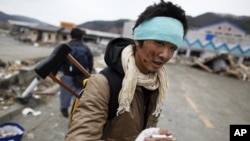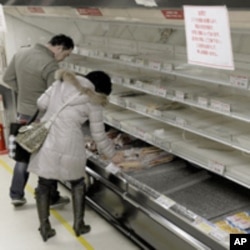The government of Japan is rushing doctors and aid supplies to thousands of people left without food, water and shelter in the aftermath of a catastrophic earthquake and tsunami that flooded swathes of northeast Japan, as fears of a nuclear meltdown permeate the country.
The scale of the triple-disaster is enormous. U.N. Office for the Coordination of Humanitarian Affairs spokesperson Stephanie Bunker told VOA Tuesday she had "not seen one [a crisis] quite like this before."
Television pictures on Tuesday from hard-hit Sendai show people lined up for water, canned food, and some stores rationing food sales to 10 items per person. In other areas, the 100,000 personnel deployed by the government are attempting to rescue survivors stranded by the flood waters and mountains of debris.
In Koriyama, in the Fukushima area where the crippled nuclear power plant is leaking radiation, people have fled the region. Others are living in damaged homes or trying to repair their houses. Most businesses have closed. One hardware store had a sign warning they were out of tarp and water containers.
Listen to this interview with VOA's Steve Herman, reporting from Koriyama
Workers at Japan's nuclear power plant in Fukushima are desperately trying to cool down reactors that are threatening to meltdown and release dangerous amounts of radiation.
Supplies of gasoline are also running low and expressways have been closed off to all vehicles except for emergency traffic. Bunker said there was a need for clean water, food and blankets, and for those who have lost everything, basic things like soap and toothbrushes.
Japan's NHK television on Tuesday quoted government officials as saying just over 3,000 are confirmed dead, but more than 10,000 are missing and feared dead.
Rescue operation
Rescue crews still were struggling through debris-blocked roads to get to hundreds of thousands of people whose towns and villages were leveled by Friday's magnitude-9 earthquake and a subsequent tsunami.
Millions more are in need of food, water and electricity, while relief efforts are complicated by the widespread destruction of infrastructure. Authorities say they are also desperately short of coffins and body bags for the earthquake victims, many of which are washing up on northeastern beaches.
The government says 15,000 people have already been rescued and 450,000 have been evacuated nationwide. Of the missing, many may have been washed out to sea by the 10-meter tsunami.
Aftershocks continue
Further south in the capital Tokyo, aftershocks are still shaking buildings every hour or so. Mayo Issobe, who lives in the suburbs, told VOA there had been a run on toilet paper, batteries and gasoline as people started to stock up against shortages.
But mostly she said people felt hopeless against the level of devastation, saying "there is a limit to what you can worry about and what you can do. Life goes on," she said.





